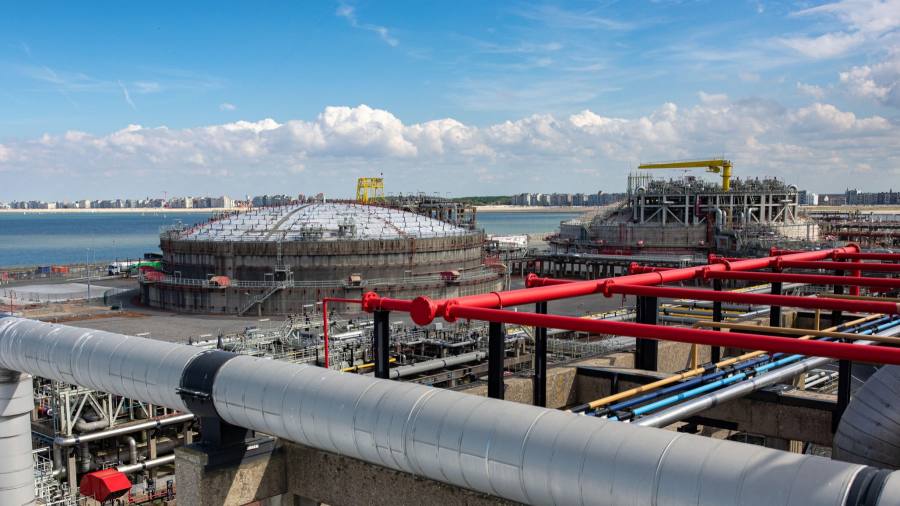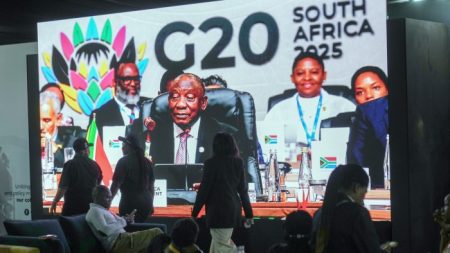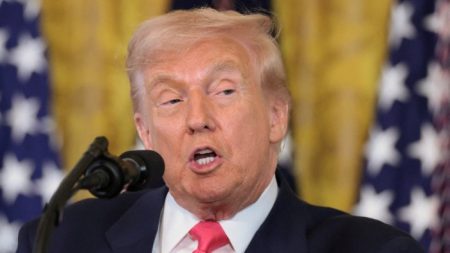Receive free EU energy updates
We’ll send you a myFT Daily Digest email rounding up the latest EU energy news every morning.
The EU is set to import record volumes of liquefied natural gas from Russia this year, despite aiming for the bloc to wean itself off Russian fossil fuels by 2027.
In the first seven months of this year, Belgium and Spain were the second and third-biggest buyers of Russian LNG behind China, according to analysis of industry data by Global Witness, a nongovernment organisation.
Overall, EU imports of the super-chilled gas were up 40 per cent between January and July this year compared with the same period in 2021, before Russia’s full-scale invasion of Ukraine.
The jump comes from a low base as the EU did not import significant amounts of LNG before the war in Ukraine due to its reliance on piped gas from Russia.
But the rise is much sharper than the global average increase in imports of Russian LNG, which was 6 per cent over the same period, Global Witness said.
The NGO’s analysis is based on data from industry analytics company Kpler, which showed that the EU is importing about 1.7 per cent more Russian LNG than it did when imports hit a record high last year.
Global Witness said the cost of the LNG imported from January to July at spot market prices amounted to €5.29bn.
“It’s shocking that countries in the EU have worked so hard to wean themselves off piped Russian fossil gas only to replace it with the shipped equivalent,” said Jonathan Noronha-Gant, senior fossil fuel campaigner at Global Witness. “It doesn’t matter if it comes from a pipeline or a boat — it still means European companies are sending billions to [Vladimir] Putin’s war chest.”
Most of the Russian volumes come from the Yamal LNG joint venture, which is majority-owned by the Russian company Novatek. Other stakes are held by France’s TotalEnergies, China’s CNPC and a Chinese state fund. The venture is exempt from export duties but is subject to income tax.
As well as resulting in billions of euros in revenues going to Russia at a time when the EU continues to tighten its sanctions regime against Moscow, the import levels leave the EU exposed to any sudden decision by the Kremlin to cut supplies as it did for piped gas last year.
Alex Froley, senior LNG analyst at consultancy ICIS, said that “long-term buyers in Europe say they will keep taking contracted volumes unless it is banned by politicians”. He added that an EU ban on imports would cause some disruptions to shipping as global trade patterns would need to be rearranged, “but ultimately Europe could find other suppliers and Russia other buyers”.
Belgium imports large volumes of Russian LNG because its port of Zeebrugge is one of the few European points of transshipment for LNG from ice-class tankers used in the high north to regular cargo vessels.
Spain’s utility Naturgy and France’s Total also have continuing contracts for large quantities of Russian LNG, analysts said.
EU policymakers have been urging European companies not to buy Russian LNG.
Spanish energy minister Teresa Ribera, whose government is chairing the six-month rotating presidency of the EU, said in March that LNG should be hit with sanctions, adding that the situation was “absurd”.
Kadri Simson, the EU’s energy commissioner, has said that the bloc “can and should get rid of Russian gas completely as soon as possible, still keeping in mind our security of supply”.
EU officials have pointed to an overall effort to phase out Russian fossil fuels by 2027, but warned that an outright ban on LNG imports risked prompting an energy crisis akin to last year when EU gas prices hit record highs of more than €300 per megawatt hour.
One official said that despite European gas storage containers being more than 90 per cent full ahead of winter, there was still “a lot of nervousness” should there be any further cuts to supplies.
Russian LNG accounted for 21.6mn, or 16 per cent, of the EU’s total 133.5mn cubic metres of LNG imports (equivalent to 82bn cubic metres of natural gas) between January and July, Kpler data shows, making it the bloc’s second-biggest supplier of the liquid fuel after the US.
In March, energy ministers introduced a clause to new rules governing the bloc’s gas market that would allow governments to ban Russian and Belarusian companies booking capacity on EU LNG infrastructure in an effort to find a legal way to prevent imports.
But the proposal must first be negotiated with the European parliament before it can take effect.
Henning Gloystein, director of energy, climate and resources at Eurasia Group, said the likelihood of governments having to order industry shutdowns because of gas shortages this winter was “near zero”.
The EU must cut demand by a further 10 per cent, Gloystein added. “If we don’t structurally reduce gas consumption by 10 to 15 per cent, we are at risk of repeating this race [for supplies] every year.”
Read the full article here














